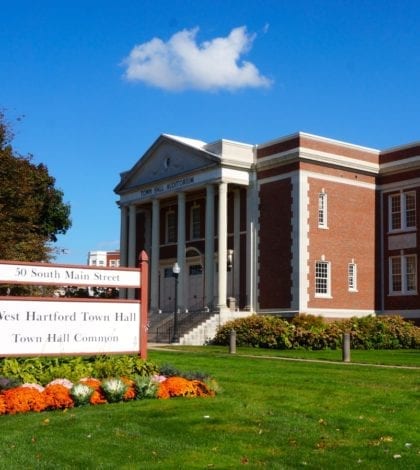Governor Malloy Slashes Another $2.2 Million from State Aid to West Hartford

Audio By Carbonatix

West Hartford Town Hall. Photo credit: Ronni Newton
Gov. Dannel Malloy has made an additional $91 million in municipal aid cuts, and the impact on West Hartford is a $2.2 million reduction.
By Ronni Newton
Town leaders are reeling after learning on Friday of Gov. Dannel P. Malloy’s decision to cut West Hartford’s municipal aid by $2.2 million for Fiscal Year 2018, as part of his application of $181.6 million of budget lapses – unspecified reductions he was tasked with allocating after the legislature passed its bipartisan budget on Oct. 26.
On Friday, Malloy made $91 million of those the cuts through holdbacks of municipal aid, and while the new cuts impacted every town in the state in some way, at $2.2 million West Hartford’s impact is the second highest of all. Only Enfield, with a reduction of $2.3 million, fared worse.
West Hartford is now looking at a $3.8 million reduction overall reduction in state aid for the current fiscal year in comparison to what was received in FY2017.
Legislators and town officials said they never saw this coming, are furious with the governor, and can’t understand the rationale or the methodology Malloy claimed to use in allocating the latest round of municipal aid cuts.
State Sen. Beth Bye (D-5th) said that the governor’s cuts to local education “show a patent disregard for legislative intent with the budget we passed. It also shows a deep lack of understanding of how critical funding for public schools is for Connecticut’s economic competitiveness.”
Bye said that legislators were feeling really good after reaching a bipartisan agreement and maintaining the majority of municipal aid, and while it’s not unusual to leave a lapse in the budget, in this case it gave the governor too much power which he used with “utter disregard for our intent.”
Malloy was unhappy with being left out of the negotiations for the bipartisan budget he ultimately signed, and being collaborative “is not one of his strengths,” Bye said.
“Folks saying somehow we knew this would happen is utter baloney,” said Bye. “We fought. We felt really good that we got what we needed.”
“It wasn’t expected,” West Hartford Town Manager Matt Hart said. He learned of the cuts on Friday afternoon in an email from the Office of Policy and Management.
West Hartford Mayor Shari Cantor said despite ongoing dialogue with the governor’s office throughout the months-long budget negotiations, the latest cuts came as a complete surprise. She learned about it at the same time as Hart, when they were meeting Friday afternoon on another matter.
“I feel like I’ve been punched in the stomach again. This sounds like a refrain,” said Cantor in a phone interview over the weekend. She said that the governor seems to be punishing the success of West Hartford.
“We should be modeled, not dismantled,” Cantor said. The town, most recently ranked 125th out of 169 in per pupil spending, has been able to achieve efficiencies while maintaining excellent schools with a very diverse population.
“Shari [Cantor] and I are anxious to see what formula was used, because we’ve looked at all of the cuts and can’t find a common denominator,” Hart said.
“West Hartford is one of the very few successful rim suburbs in all of New England,” Bye said. “Our schools are economically integrated and successful, and the demands on its school system are unique. Targeting West Hartford, once again, shows the governor’s complete lack of understanding of this unique community and very clearly punishes success.”
Bye said that one major reason people move to communities in this state is because of the strong education system, and targeting Educational Cost Sharing as well as higher education is extremely damaging to what has been a key strength.
“It is also noteworthy that the governor cut no funding from charter schools in his latest funding,” Bye said. Distressed municipalities were also spared the brunt of cuts, with cities like Hartford and Bridgeport getting only a $300,000 hit in the latest round.
State Rep. Derek Slap (D-19) said the governor “just doesn’t get it,” and he is determined not to settle for the latest move by the governor.
“I spoke with House leadership immediately after seeing the governor’s misguided plan and urged action,” said Slap. “They have assured me that they’re discussion options and that it’s possible the general assembly could reconvene prior to the beginning of the next legislative session in February to rescind the cuts to municipal aid.”
“The general assembly worked across party lines to reject the governor’s approach this past session and I will certainly be advocating for this bipartisan effort to continue,” said Slap.
Bye also said that she’s talking to legislative leaders to determine if there is any recourse, but because the cities weren’t as negatively impacted it may be harder to reach a bipartisan agreement.
Town Council Minority Leader Denise Hall, a Republican, said the town needs to be prudent with its spending and not be so dependent on state aid.
“People were relieved that a budget was passed, but the problems weren’t solved and the state’s revenue from income and sales tax are already behind projections,” she said. “This latest cut just illustrates that West Hartford needs to adjust our spending so as not to be reliant on any state funds in the future.”
Cantor said that everything falls back on the property owners because of the lack of diversification and elasticity in the ability of municipalities to generate revenue. “As state aid decreases, everything falls to property taxes,” which she said is oppressive, especially to seniors who may be living on fixed incomes but in properties that have appreciated.
Hart said that the Town Council’s Finance and Budget Committee will discuss the specifics on how to absorb the cuts at its Dec. 1 meeting, but in the meantime the town is operating under fiscal restrictions that he had put into place several months ago and had not unfrozen.
In September, amid continued budget uncertainty, Hart had asked departments to set aside all payroll savings associated with funded full- and part-time vacant positions and proposed reductions in overtime, as well as 10 percent of all non-payroll accounts. “We have frozen all positions except those that are ‘mission critical,’ like a police chief and assistant fire chief,” Hart said.
Hart said the numbers could change again, depending on revenues received by the state at the end of the year and how that impacts the overall budget.
“We will continue to educate residents, extract efficiencies, and encourage smart development that will benefit the community,” Cantor said.
It’s important to remain level-headed and strategic, but at the same time, it’s a difficult environment to manage, Cantor said.
“You don’t penalize communities that do well. If you do, well, what’s the incentive? Why be successful if you get punished?” Cantor said.
“I will continue to fight, fight, fight,” Cantor said, “to put West Hartford in the position where we continue to be the best community in which to live, work, and play.”
Like what you see here? Click here to subscribe to We-Ha’s newsletter so you’ll always be in the know about what’s happening in West Hartford!




[…] Or one more unexpected budget story to write … (Click here to read the one that I did not expect to write this weekend.) […]
If the town leadership did not expect this it speaks to the need for wiser town leadership.
It was cheap politics for Malloy to do this after the election. WH council members were congratulating themselves on a crisis averted when it was just crisis delayed.
West Hartford is killing residential property values with its excessive taxation. Despite high increases for the school budget, school ratings languish in the middle of the road with few exceptions (see zillow.com). There is more pressure to leave than to buy in.
“We will continue to educate residents, extract efficiencies, and encourage smart development that will benefit the community,” Cantor said.
While development makes sense at first glance, we seem to be faced with accelerating tax bills despite the development. The town for many years lost a lot of taxpayer money on the Blue Back garages. New traffic patterns require redoing roads and highway exits. More kids in the schools for residential development.
Our tax bills don’t support the theory of development keeping the taxation in check.
[…] a reduction of state aid. The legislature finally passed a budget on Oct. 26, and even after the governor slashed an additional $2.2 million from West Hartford’s aid on Nov. 17, the contingency is enough to cover the shortfall, which according to Privitera now totals $6.9 […]
[…] The budget passed by the town, which included $4.5 million in cuts, provided a $7 million contingency for cuts in state aid – which ultimately turned out to be right on target when the state budget that was ultimately adopted cut aid to West Hartford by about $6.7 million. […]